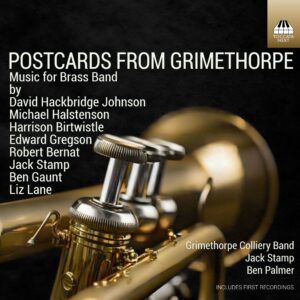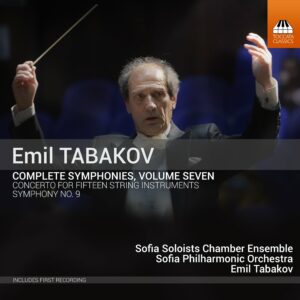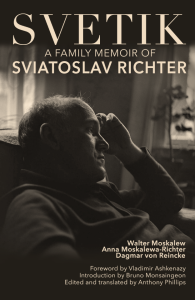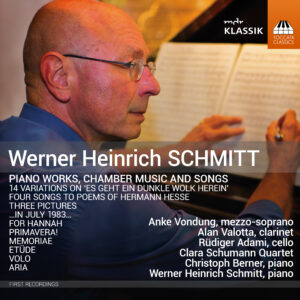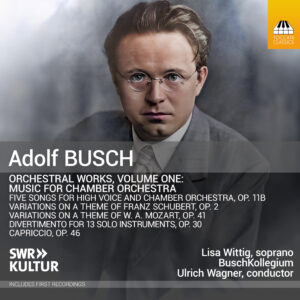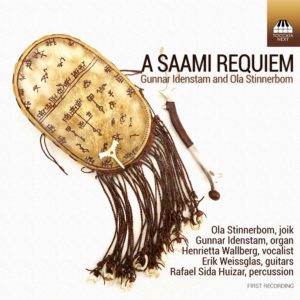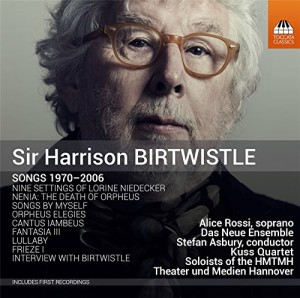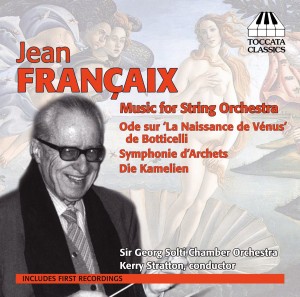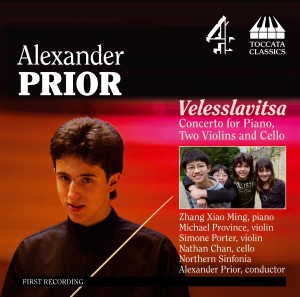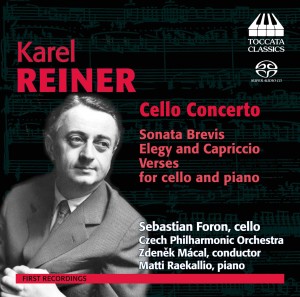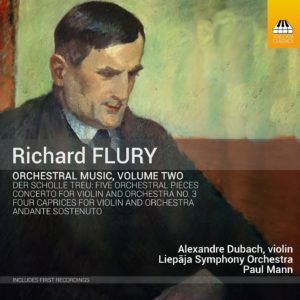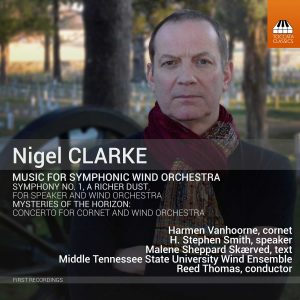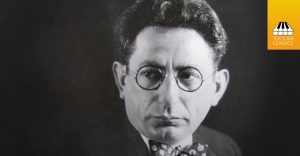Search Results for "cuilolo21 live"
Showing results for cielo live
Postcards from Grimethorpe: Music for Brass Band
When the American composer Jack Stamp was appointed International Composer-in-Association to the Grimethorpe Colliery Band in 2019, he conceived a recording project focused on works specifically written for the GCB, including compositions by himself and Liz Lane, the other GCB Composer- in-Association, alongside other pieces which have played a prominent role in the Band’s recent activities. The kaleidoscopic range of styles to be heard here displays the extraordinary virtuosity of one of the world’s best-known brass bands.
Grimethorpe Colliery Band
Jack Stamp, conductor
Ben Palmer, guest conductor
Livia Teodorescu-Ciocănea: Orchestral Music
These three works by the Romanian composer Livia Teodorescu-Ciocănea (b. 1959) show her approach to three of the central genres of the western classical tradition: symphony, concerto and cantata. The powerful and programmatic Archimedes Symphony was inspired by the death of Archimedes in the siege of Syracuse in 214 BC; the Rite for Enchanting the Air – a concerto for various flutes and orchestra – is a kind of magical journey into a dizzying world of sound and colour; and the cantata Mysterium tremendum aims to reconcile Byzantine and Catholic liturgical traditions. All three make clear her fascination with orchestral timbre and texture – and have distant roots in Romanian folk-music.
Pierre-Yves Artaud, flutes (Tracks 5–8
Antonela Barnat, mezzo-soprano (Tracks 9–12)
Romanian Radio National Orchestra (Tracks 1–8)
Radio Romania Chamber Orchestra (Tracks 9–12)
Valentin Doni (Tracks 1–4)
Alan Tongue (Tracks 5–8)
Cristian Oroșanu (Tracks 9–12), conductors
Emil Tabakov: Complete Symphonies, Volume Seven
The music of the Bulgarian composer-conductor Emil Tabakov (b. 1947) explores the darker side of the human spirit in monumental scores as austere as they are powerful. Like many of his earlier symphonies, the Ninth, nearly an hour in length, is conceived on a massive scale. The opening Adagio forms an epic, glacial prelude to the driving Presto second movement. Two further slow movements follow: a Largo, which offers an island of relief after the tumult of the scherzo, and a finale which, after opening with an extensive Largo of its own, is transformed into a wild, driving, violent Allegro moderato. The symphony is prefaced by a virtuoso study for string ensemble written over 30 years earlier and remarkable for its contrapuntal fireworks and its explosive, almost elemental energy.
Sofia Soloists Chamber Ensemble (Tracks 1–3)
Sofia Philharmonic Orchestra (Tracks 4–7)
Emil Tabakov, conductor
George Enescu: The Unknown Enescu, Volume Two
Although Enescu gave opus numbers to only 33 of his works, he left an enormous number of pieces in varying stages of composition, from sketches and draft outlines to isolated movements and some scores that are almost complete. Working with a handful of composers and musicologists – fellow Romanians with specialist knowledge of Enescu’s style – the violinist Sherban Lupu has produced performing editions of a number of previously unknown works, heard here in the context of other Enescu rarities. One of these ‘rescued’ pieces, hiding behind the modest title of Caprice Roumain, is nothing less than a major violin concerto.
Sherban Lupu, violin
Ian Hobson, piano (Track 1), conductor (Tracks 8–11)
Viorela Ciucur, piano (Tracks 3–7)
Sinfonia da Camera (Tracks 8–11)
SVETIK: A Family Memoir of Sviatoslav Richter
Walter Moskalew, Anna Moskalewa-Richter and Dagmar von Reincke
Foreword by Vladimir Ashkenazy
Introduction by Bruno Monsaingeon
Translated and edited by Anthony Phillips
Extent: 462 pages
Size: 16 x 24 cm
Published: October 2015
Illustrations: c. 30 colour illustrations; c. 250 b/w illustrations
Werner Heinrich Schmitt: Piano Works, Chamber Music and Songs
Werner Heinrich Schmitt, born in Mannheim in 1961, began to study the piano in boyhood, and soon started to compose as well. Since then he has earned his living as a pianist, writing music as time permitted. This first album of his works reveals a composer of considerable substance, particularly in the two moving song-cycles that book-end this album. The sensitivity and resourcefulness of Schmitt’s aural imagination are confirmed in the chamber and piano pieces heard here. Some are infused with joy, others with sorrow, but they all speak a musical language that aims to speak to the listener directly.
Anke Vondung, mezzo-soprano
Alan Valotta, clarinet
Rüdiger Adami, cello
Clara Schumann Quartet
Christoph Berner, piano
Werner Heinrich Schmitt, piano
Adolf Busch: Orchestral Works, Volume One
Long celebrated as one of the finest violinists in history and the leader of an exemplary string quartet, Adolf Busch (1891–1952) is slowly being discovered also as a major composer, with a style close to that of his good friend Max Reger. As with Reger, Busch combines effortless counterpoint, warm harmonies, a strong sense of orchestral colour and an ear for a good tune – as witness the five works to be heard here, four of them in their first recordings and the other in its first modern recording.
Lisa Wittig, soprano
BuschKollegium
Ulrich Wagner, conductor
A Saami Requiem
A Saami Requiem is an extraordinary meeting-place of musical cultures – western classical, Sámi yoik, Nordic folk-dance, electric rock, blues, improv and more. It takes the form of a journey to Saajva, the Kingdom of Death in Sámi religious practice. With it the Swedish organist Gunnar Idenstam and Sámi artist Ola Stinnerbom provide a parallel to the Christian Requiem, with Ola Stinnerbom as Noite, the shaman who acts as guide to the Kingdom of Death – and back to this life, celebrated in the uplifting closing hymn. Some of the percussion sounds are sampled from traditional Sámi drums made by Ola Stinnerbom after ancient models; the electric guitars provide a link to rock groups like Deep Purple and King Crimson; and Gunnar Idenstam’s unmistakable style marries the French organ tradition with the alluring world of Swedish folk-music.
Ola Stinnerbom, yoik (Tracks 2–14)
Gunnar Idenstam, organ (Tracks 1–7, 9–14)
Henrietta Wallberg, vocalist (Tracks 7, 8, 10)
Erik Weissglas, guitars (Tracks 3–6, 9, 12–14)
Rafael Sida Huizar, percussion (Tracks 3–6, 8, 10–14)
Sir Harrison Birtwistle: Songs 1970-2006
Instrumental and vocal techniques are intertwined in the music of Harrison Birtwistle: he often treats the voice instrumentally and his instrumental writing has vocal characteristics. Many of his works for small ensembles, with or without voices, occupy this common ground, his highly individual style juxtaposing the static and the violently dynamic and intersecting with his fondness for ritual and myth – not least a recurrent concern with the figure of Orpheus. This recording presents some of these relatively neglected pieces, recorded live in the presence of the composer, who also talks about his songs in interview.
Jean Françaix: Music for String Orchestra
Jean Françaix (1912-97) has long enjoyed a reputation as one of the happier composers, his Gallic charm and breezy good humour obscuring the superb craftsmanship of his writing. Françaix once observed that 'I live in exile in my own country and am nourished from abroad' — Plus ça change, he then might have thought, with this CD presenting an Hungarian ensemble led by a Canadian conductor on a British label, with two first recordings and a rare hearing for one of his more substantial scores.
Sir Georg Solti Chamber Orchestra, Budapest, chamber orchestra
Kerry Stratton, conductor
Alexander Prior: Velesslavitsa, Concerto for Piano, Two Violins and Cello
In spring 2009 Channel 4 sent the sixteen-year-old British-Russian composer-conductor Alex Prior around the world: his task, to find 'The World's Greatest Musical Prodigies' for a TV series with that title and to compose a concerto for them, which Alex would conduct. The resulting work, Velesslavitsa (the title means 'Glory to Veles', the god of music in ancient Slav cultures), is steeped in the Russian Romantic tradition, with echoes especially of Mussorgsky and Rimsky-Korsakov. This live recording features the ten-year-old Chinese pianist Zhang Xiao Ming, the American violinists Simone Porter and Michael Province, twelve and thirteen, and the fifteen-year American cellist Nathan Chan.
Alexander Prior, conductor
Zhang Xiao Ming, piano
Michael Province, violin
Simone Porter, violin
Nathan Chan, cello
Northern Sinfonia, chamber orchestra
Karel Reiner: Music for Cello
Karel Reiner (1910-79) — a major missing voice in Czech music — suffered under both of twentieth-century Europe's major tyrannies. As a Jew he was imprisoned by the Nazis, miraculously surviving a series of atrocities: Terezín, Auschwitz, a camp near Dachau and a death march. Then, back in Prague after the War, he was accused of 'formalism’ by the Communists. This first CD of a series reviving Reiner's music presents the large-scale Concerto he completed just before his internment in Terezín — and first heard, in this live performance, only in 2010 — and three chamber pieces which evolve though echoes of Janáček and Martinů to the brittle humour of the Stravinskyan Verses, one of his last works.
Sebastian Foron, cello
Czech Philharmonic Orchestra, orchestra
Zdeněk Mácal, conductor
Matti Raekallio, piano
Herman Galynin: Piano Music, Volume One
The Russian composer Herman Galynin (1922-66) studied at the Moscow Conservatory with Shostakovich and Myaskovsky, producing a flow of brilliant compositions while still a student. They fuse influences from his teachers — Shostakovich's wit and irony and Myaskovsky's lyrical introspection — with Prokofiev's rhythmic energy to produce a language very much his own. Although he was dogged by ill fortune (he was an orphan) and ill health, Galynin's music expresses a defiant will to live with verve and humour.
Olga Solovieva, piano
Richard Flury: Orchestral Music, Volume Two
This second volume of orchestral music by the Swiss composer Richard Flury (1896–1967) brings works from across his career. A suite drawn from an early Festspiel – a community pageant – opens with a march of Elgarian swagger and continues with a mix of charm and substance. Flury was a gifted violinist, and his Third Violin Concerto, written at the height of the Second World War, is virtuosic and lyrical in equal measure, its unashamed Romanticism perhaps an escape from troubled times. The four late Caprices for violin and orchestra form a concertante serenade in all but name; and one of his very last pieces was a dark and moving tribute to a musician friend, the slow movement of a suite he did not live to finish.
Alexandre Dubach, violin (Tracks 6 – 9, 11 – 13)
Liepāja Symphony Orchestra
Paul Mann, conductor
Nigel Clarke: Music for Symphonic Wind Orchestra
A Richer Dust, the epic First Symphony of the English composer Nigel Clarke (b. 1960), explores what it means to live with violence and extremism, the constant companions of human history. The work intertwines words by Malene Sheppard Skærved with Clarke’s music, weaving together ideas and images in fragments of text from both historically significant figures and voiceless, ordinary people. The dark and powerful atmosphere of the Symphony is prefaced by the bright and sassy sound of Clarke’s Magritte-inspired Mysteries of the Horizon, a concerto for cornet and wind orchestra.
The Re-Emergence of Leo Zeitlin
The story of Leo Zeitlin and his music’s re-emergence is so remarkable that it has already been duly reported in several online and printed articles.…
Stay In the Know
JOIN THE TOCCATA NEWSLETTER
"*" indicates required fields
By visiting our site, you agree to our privacy policy regarding cookies, tracking statistics, etc.
